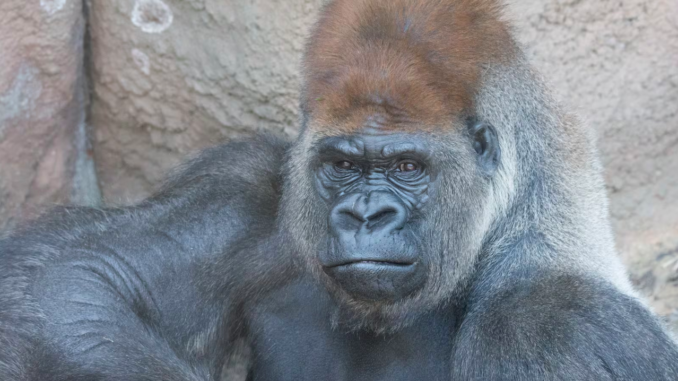
This article was originally published on The People's Voice. You can read the original article HERE

“Little Joe,” the beloved western lowland gorilla who called the St. Louis zoo home for years, has passed away after suffering a heart attack, according to the zoo.
The 26-year-old gorilla passed away three years after he was injected with an “experimental” COVID-19 vaccine from Zoetis, a global animal health company which donated tens of thousands thousands of doses of mRNA to zoos in the United States.
According to the zoo, Little Joe had been receiving treatment for heart problems in recent years. The zoo reported he passed away peacefully in his sleep.

BYPASS THE CENSORS
Sign up to get unfiltered news delivered straight to your inbox.
You can unsubscribe any time. By subscribing you agree to our Terms of Use
St. Louis Zoo broke the news on social media:
“It is with incredible sadness that we share news that western lowland gorilla Little Joe, who had been under treatment for heart disease, passed away of a heart attack overnight on May 4th. Based on video monitoring, it appears he died in his sleep.
Joe, 26, came to the Saint Louis Zoo in November 2005. He was loved by the primate staff and grabbed the heart of all those who saw or met him, frequently hanging out near guest viewing areas to people watch. Joe has been an integral part of the Zoo’s bachelor gorilla group since he arrived, most recently getting to know juvenile males Kayin and Zachary as they settled into their new home, as well as hanging out with his long-time gorilla buddy, Bakari.
Joe’s wonderful personality and lovable grumpy face endeared him to all who worked with him. He will be greatly missed.”
Little Joe’s passing comes after the Saint Louis Zoo’s initiative, announced in 2021, to vaccinate animals against COVID-19, focusing on those with the highest risk of contracting the virus.
The Zoo explained their vaccination efforts in a statement:
Over the next few months, the Zoo plans to administer the two-dose COVID-19 vaccine in a staged roll-out to almost 100 primates, big cats, river otters, painted dogs and bat-eared foxes, all of which carry a potential risk of being infected by SARS-CoV-2, the virus that causes COVID-19 disease. Doses are given three weeks apart and full vaccination is reached two weeks after the second dose.
“Preventive health is most of what we do here,” said Sathya Chinnadurai, DVM, Director of Animal Health, Saint Louis Zoo. “We really believe in keeping our animals healthy, not just treating them when they are sick. Vaccines are nothing new for us. As with every vaccine we administer, we first determine risk of exposure, risk of illness from the disease and potential vaccine side-effects. With cases of coronavirus infection coming up in zoos around the country, we are lucky to be able to give this vaccine to our at-risk patients.”

The COVID-19 vaccine used at the Zoo was provided by Zoetis, a global animal health company, which donated 11,000 experimental doses to various zoos and animal organizations nationwide, including Saint Louis Zoo.
“Zoetis, a global animal health company headquartered in Kalamazoo, Michigan, and the distributor of the vaccine, has donated 11,000 doses of the COVID-19 vaccine to dozens of zoos, including the Saint Louis Zoo, and animal organizations across the nation.
Experimental use of this COVID-19 vaccine from Zoetis is authorized by the U.S. Department of Agriculture and the Missouri State Veterinarian.”
This article was originally published by The People's Voice. We only curate news from sources that align with the core values of our intended conservative audience. If you like the news you read here we encourage you to utilize the original sources for even more great news and opinions you can trust!








Comments